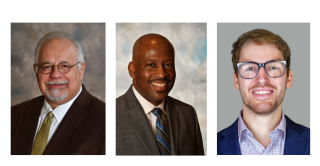
Contact Information
The Office of Accessibility Services
Willard-DiLoreto Hall, Room W 201
DisabilityServices@ccsu.edu
860.832.1952
860.832.1865 (Fax)
Office Hours
Monday - Friday
8 a.m. - 5 p.m.
CCSU's Office for Office of Accessibility Services (OAS) is committed to providing equal access to an educational experience through the provision of reasonable accommodations and services to qualified students with disabilities in order to reduce or eliminate any disadvantages that may occur as a result of an individual's disability. In determining reasonable accommodations, CCSU is guided by the federal definition of "disability" which describes an individual with a disability as someone who has:
A reasonable accommodation is a modification or adjustment to a course, program, service, job activity, or facility that ensures an equal opportunity for qualified students with disabilities to participate in, and enjoy the benefits of, a service, program, or activity. Aids, benefits, or services need not produce equal results, but must afford an equal opportunity to achieve equal results. When necessary, SDS staff will consult with faculty regarding whether an accommodation would fundamentally alter the nature of the service, program or activity or whether an academic requirement is essential to the instruction being pursued or to any directly related licensing requirement. In doing so, SDS will examine the following:
When the University determines that a modification related to facilities or communication would result in a fundamental alteration or undue burden, SDS shall acquire the written opinion of the proper authority, i.e. department chair of impacted discipline, providing the reasoning supporting the decision.
Eligibility for services/accommodations from SDS is a separate process from admissions. The admissions process for students with disabilities is the same as for all other students. Disclosure of a disability is voluntary; however, students may consider disclosing the disability when high school academic performance was adversely affected due to the disability. Disability documentation is reviewed on a case-by-case basis and does not override the primary admissions criteria. For confidentiality reasons, is it recommended that disability documentation be provided directly to SDS.
In order to receive accommodations from SDS, students must first obtain appropriate documentation of their disabilities from a qualified professional. Disability documentation is credible evidence from, for example: a licensed or certified professional, PhD, MD, psychologist, audiologist, etc. who can attest to the existence of a disability, the impact of the alleged disability on academic performance and related competencies and make recommendations for equal access and/or academic compensatory measures, known as accommodations.
SDS offers a wide variety of legally mandated services for students with documented disabilities. After reviewing the documentation of disability, the coordinator will provide appropriate academic accommodations specific to the student's functional limitations in the academic setting and train the student on accessing the approved accommodations. Students should request accommodations in a timely manner and follow SDS policies and procedures for accessing accommodations as outlined in this section.
Note: SDS does not provide assistance or equipment, i.e. homework assistance, typing, personal laptops, or personal aids.
There are six main services at SDS: